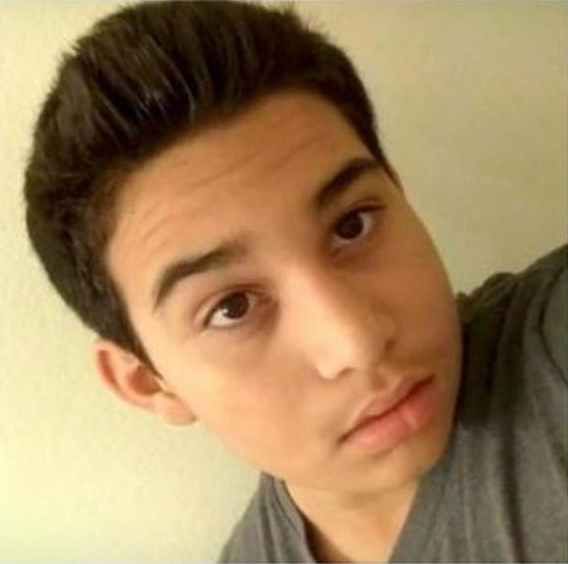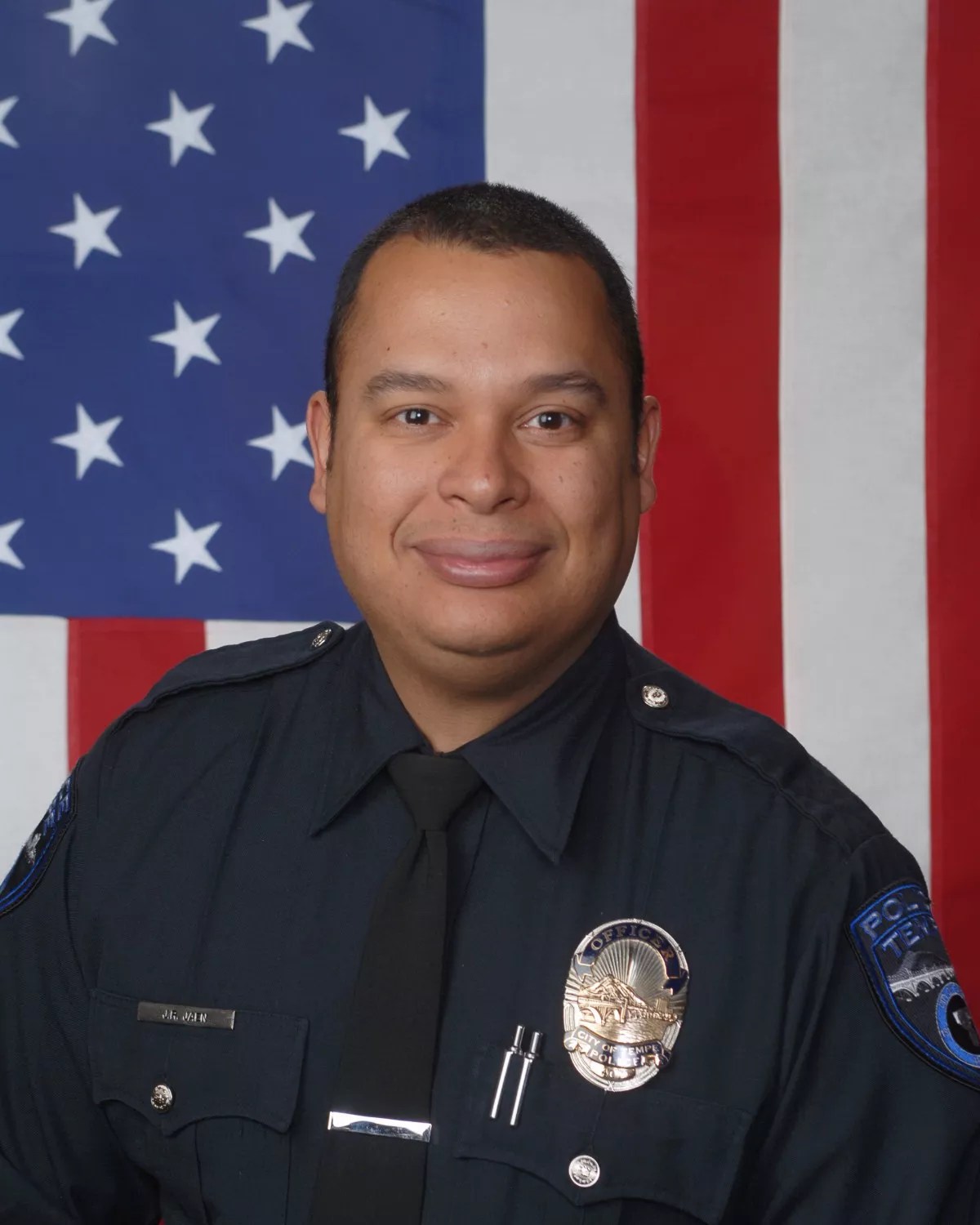
Tempe Police Department

Audio By Carbonatix
The city of Tempe imposed an extraordinary precondition in order for the parents of 14-year-old Antonio Arce to receive police records that could shed light on the death of their son, who was fatally shot in the back by Officer Joseph Jaen in January.
Tempe attorneys in May drafted a nondisclosure agreement swearing Arce’s family to secrecy if they wanted to receive police reports, videos, and other records about their son’s final moments.
If the agreement was breached? A $1 million penalty.
Daniel Ortega, the attorney representing Arce’s father, Juan Antonio Arce, and mother, Sandra Gonzalez, declined to sign the agreement. As a result, Ortega has yet to see public records he requested more than 200 days ago, which he had planned to use while drafting a civil rights lawsuit on behalf of the Arce family.
“Look, this is probably the worst violation of the public records law that I have ever experienced over 35 years of requesting records from public entities,” Ortega said in a phone interview.

Antonio Arce
Joel Robbins, a civil attorney who frequently represents police brutality victims, said he has “never” encountered a nondisclosure agreement as a condition of receiving police documents under Arizona’s public records law.
“That sounds crazy,” Robbins said.
Jeff Bouma, another civil attorney, also said he never has been asked to sign a confidentiality deal to receive public records.
Bouma added that he would never agree to such conditions except in the case of an “ongoing police investigation that was legitimate” and only then “as narrowly as possible and for limited duration with a lot of exceptions.”
Bouma wrote in an email: “Civil rights cases are meant not just to provide relief and a remedy for the victim, but as a necessary part of civilian and court oversight of of the government, including police and prosecutors. It is presumed that the proceedings and government records will be available to the public at some point.”
Tempe spokesperson Kris Baxter-Ging did not respond to a detail list of questions on Wednesday, citing a city policy not to comment on pending litigation.
On Friday evening, more than a day after this story was published, Baxter-Ging sent out a media release disputing facts in this story, including a claim without evidence that non-disclosure agreements are “fairly common in cases in which a criminal investigation is pending.”
$1 Million
Back on January 15, Jaen was responding to a call about a suspicious vehicle. He saw Arce in a truck near 48th Street and Baseline Road. According to body camera footage of the incident, Jaen pulled out his service weapon as Jaen exited the vehicle. Arce then ran away from the officer down an alley. Jaen fired two rounds in the teenager’s direction. One bullet struck Arce near his right shoulder blade. He later was declared dead at a hospital.
A toy replica gun was found at the crime scene.
Body camera footage of the incident triggered protests and inflamed tensions between law enforcement and the public, which was already reeling from several high-profile shootings. Arce’s case made national headlines and was mentioned by Julián Castro during a Democratic presidential primary debate.
Jaen resigned from the force in May. Tempe police conducted a criminal homicide investigation into the shooting and submitted a case to the Maricopa County Attorney’s Office on February 15. Prosecutors have yet to decide whether to charge the officer for the shooting.
As Arce’s death drew media attention and the criminal investigation against Jaen proceeded, Arce’s family hired Ortega to prepare litigation against the city of Tempe.
Ortega filed a public records request on February 14, 2019, for documents, audio, and video related to the case, including: police reports, body camera footage, radio communications, computer dispatch reports, Jaen’s personnel file, use-of-force policies, and more.
Such records are commonly requested by journalists, community groups, and other interested parties in high-profile police cases. (Two weeks before Ortega’s request, Tempe police showed reporters three body camera videos from the incident that they had not released to the public. The department prohibited reporters from taking copies or making recordings of the videos, citing sensitivity to Arce’s family.)
Tempe responded to Ortega’s request, indicating that it would turn over records if the attorney agreed to keep some documents confidential.
Ortega told Phoenix New Times he agreed with the city’s terms in the interest of preparing a notice of claim for Arce’s family, for which he had 180 days to file from the day of the shooting.
But Ortega was not prepared for how Tempe would respond.
On May 5, city attorneys sent Ortega a nondisclosure agreement with a line for his signature. According to the deal, Ortega would need to keep confidential a police report, three body camera videos, 911 calls, and computer dispatch reports produced to him in response to his public records request.

Officer Joseph Jaen
Tempe Police Department
If Ortega or one of Arce’s parents breached the agreement, Ortega’s firm would be subject to $1 million in liquidated damages.
Ortega protested the hefty penalty, according to emails entered as exhibits in Maricopa County Superior Court as part of a public records lawsuit he filed.
“[T]he amount is unreasonably large and it is a fixed amount rather than recognizing that there are different kinds and extents of a breach,” he wrote to Tempe officials five days after receiving the draft nondisclosure agreement. “It would be unreasonable to have $1 million in liquidated damages for a minor breach, especially if there is little to no damage.”
Ortega also disagreed with the lack of a sunset date on the secrecy deal. Tempe cited the ongoing criminal investigation of Jaen as the reason for the confidentiality agreement, Ortega wrote in his email.
“I insist that a time limit be specified on the duration of the agreement,” he wrote. “It is clear to me that the documents you are willing to provide will eventually be public records.”
Ortega refused to sign.
And he said Tempe refused to budge.
(Following the publication of this story, the City of Tempe claimed that it offered to re-negotiate the terms of the non-disclosure agreement. Ortega denied that claim in an interview with azfamily.com.)
The 180 days went by, and Ortega filed a notice of claim on behalf of the Arce family without records that could help inform their civil rights case against the Tempe Police Department. He said he wrote the claim based solely on media reports and the one body camera video released to the public shortly after Arce’s death.
Ortega has a year from June 24, the date of the notice of claim filing, to draft an official lawsuit against the city. But the lack of relevant documents makes it difficult to determine the substance of his case, Ortega says.
“It interferes with moving forward with the case,” Ortega said. “At this point, I can’t even hire experts, which we do early to proceed.”
Last week, Ortega sued Tempe for allegedly failing to comply with an Arizona law requiring agencies to “promptly” furnish records requested by the public.
Montgomery’s Policy
Ortega believes the proposed nondisclosure agreement was related to an unusual and legally dubious policy implemented by former Maricopa County Attorney Bill Montgomery.
The policy gave Montgomery’s office control over when local agencies can release records related to ongoing investigations. According to the policy, police departments that released certain records without the approval from prosecutors could be subject to fines.
The policy was written in a letter to police departments obtained by the Arizona Republic in May 2018.
“The desires of the public and media to view firsthand evidence of criminal conduct, particularly video evidence, will remain unabated,” Montgomery wrote in the letter. “Equally so is our continuing duty to protect the rights of the accused, any victim, and the integrity of a criminal investigation and prosecution. Our criminal justice system deserves no less to maintain our community’s trust and confidence.”
Montgomery left his post at the Maricopa County Attorney’s Office in September after Arizona Governor Doug Ducey appointed him to the state supreme court. A spokesperson for the county prosecutor’s office did not respond to a request for comment on whether Montgomery’s records policy is still in place.
The Maricopa County Board of Supervisors named Allister Adel as Montgomery’s successor on Thursday.
Correction (10/4/2019): After initially declining to respond to a list of detailed questions related to the Antonio Arce case, the city of Tempe released a statement claiming inaccuracies in this story more than a day after it was published. Since then, this article has been corrected to note that a violation of the non-disclosure agreement would not preclude the Arce family from filing a civil suit against Tempe. The story has also been updated to note that Daniel Ortega’s law firm would be liable for damages if the deal were breached, not Arce’s family.